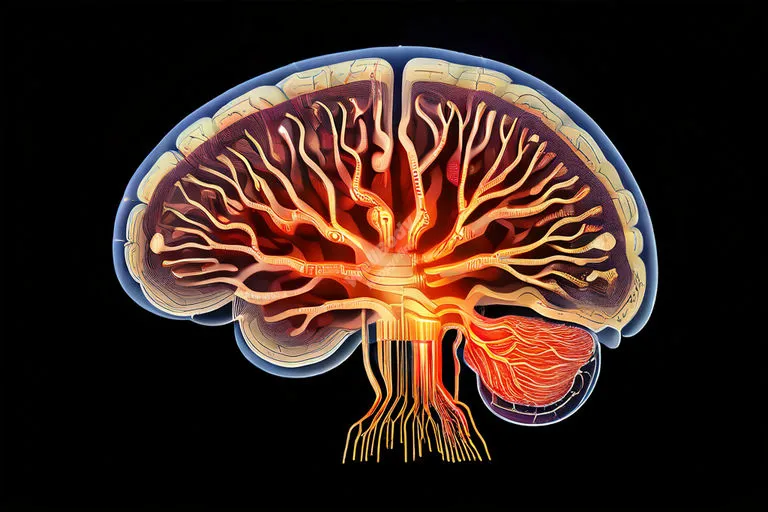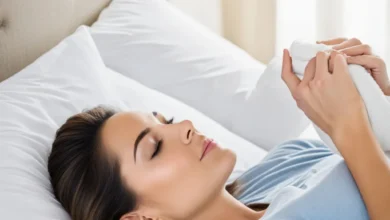Detox Sleep Connection: Boost Your Body’s Nightly Cleanse

I. Introduction
Did you know that your body performs a crucial cleansing process while you sleep? It’s true! The fascinating connection between sleep and detoxification is gaining attention in the world of health and wellness.
In this post, we’ll explore the detox sleep connection and show you how to improve sleep for detoxification. We’ll uncover why getting a good night’s rest is so important for your body’s natural cleansing processes and share simple, effective tips to enhance both your sleep quality and detoxification. By the end, you’ll have a toolbox of strategies to help you wake up feeling refreshed and support your body’s amazing ability to cleanse itself.
II. Understanding the Detoxification Process
A. What is detoxification?
Detoxification is your body’s natural way of getting rid of harmful substances. It’s like your body’s cleaning crew, working hard to remove toxins and waste that could make you sick if they build up.
B. Key organs involved in detoxification:
- Liver
- Kidneys
- Lungs
- Skin
- Intestines
C. How detoxification occurs during sleep
While you’re sleeping, your body kicks its cleaning process into high gear. It’s like a nighttime cleanup party! Your brain and body work together to flush out toxins that have built up during the day. This process is most active when you’re in deep sleep, which is why getting good quality sleep is so important for detoxification.
III. The Sleep-Detox Connection
A. Why sleep is crucial for detoxification
Sleep and detoxification are closely linked. When you sleep, your body gets a chance to focus on cleaning and repairing itself. This is when the detox sleep connection really shines. Good sleep gives your body the time and energy it needs to remove toxins effectively.
B. The glymphatic system and its role
Your brain has a special cleaning system called the glymphatic system. It’s like a washing machine for your brain that works best while you sleep. This system helps flush out toxins and waste products that build up in your brain during the day. When you improve sleep for detoxification, you’re giving this system the best chance to do its job well.

C. How poor sleep affects detoxification
- Less time for your body to remove toxins
- Reduced efficiency of the glymphatic system
- Increased inflammation in the body
- Build-up of waste products in the brain
- Weakened immune system
- Slower cellular repair and regeneration
IV. Enhancing Sleep Quality for Better Detoxification
A. Establish a consistent sleep schedule
Your body loves routine, especially when it comes to sleep. Going to bed and waking up at the same time every day helps strengthen your body’s natural sleep-wake cycle, known as the circadian rhythm. This regularity supports better sleep quality, which in turn enhances the detox sleep connection.
- Set a bedtime alarm to remind you when it’s time to start winding down
- Wake up at the same time every day, even on weekends
- Avoid naps late in the day
- Create a relaxing bedtime routine to signal to your body that it’s time to sleep
B. Create an optimal sleep environment
Your bedroom should be a sleep sanctuary. The ideal sleep environment is cool (around 60-67°F or 15-19°C), dark, and quiet. These conditions help your body relax and prepare for deep, restorative sleep, which is crucial when you want to improve sleep for detoxification.
- Use blackout curtains or an eye mask to block out light
- Invest in a comfortable mattress and pillows
- Use white noise or earplugs to minimize disruptive sounds
- Keep electronics out of the bedroom
- Use calming scents like lavender to promote relaxation

C. Limit exposure to blue light before bedtime
Blue light, which comes from electronic devices like phones, tablets, and computers, can trick your brain into thinking it’s still daytime. This disrupts your body’s natural sleep-wake cycle and can make it harder to fall asleep. When you’re trying to improve sleep for detoxification, reducing blue light exposure in the evening is key.
- Use blue light filtering apps or settings on your devices
- Wear blue light blocking glasses in the evening
- Switch to warm, dim lighting in your home after sunset
- Avoid screens for at least an hour before bedtime
- If you must use devices, enable night mode or lower the brightness
D. Practice relaxation techniques
Relaxation techniques can help calm your mind and body, making it easier to fall asleep and stay asleep. This improved sleep quality supports better detoxification. These techniques can also help reduce stress, which is important because stress can interfere with both sleep and your body’s detox processes.
- Deep breathing: Take slow, deep breaths to calm your nervous system
- Progressive muscle relaxation: Tense and then relax each muscle group in your body
- Meditation: Focus on your breath or a calming image to quiet your mind
- Gentle yoga: Perform slow, gentle stretches to release tension in your body
- Visualization: Imagine a peaceful, relaxing scene to help your mind unwind

V. Dietary Considerations for Better Sleep and Detox
A. Foods that support detoxification
Here’s a list of foods that can support both your sleep and detoxification processes:
- Leafy greens (spinach, kale, collards)
- Cruciferous vegetables (broccoli, cauliflower, Brussels sprouts)
- Berries (blueberries, strawberries, raspberries)
- Nuts and seeds (especially walnuts and flaxseeds)
- Fatty fish (salmon, mackerel, sardines)
- Turmeric
- Garlic
- Green tea
- Beets
- Avocados

B. Foods and drinks to avoid before bedtime
- Caffeine (coffee, tea, chocolate, some sodas)
- Alcohol
- Spicy foods
- High-fat or greasy foods
- Large meals
- Sugary snacks or desserts
C. Timing of meals and its impact on sleep quality
When you eat can be just as important as what you eat when it comes to the detox sleep connection. Try to finish your last meal at least 2-3 hours before bedtime. This gives your body time to digest food properly and allows it to focus on detoxification processes during sleep instead of digestion. Eating too close to bedtime can lead to discomfort and disrupted sleep, which can interfere with your body’s natural detox rhythm.
A light, healthy snack about an hour before bed can be okay if you’re truly hungry. Good options include a small handful of nuts, a piece of fruit, or a small serving of yogurt.
VI. Lifestyle Habits to Boost Sleep and Detoxification
A. Regular exercise
Regular exercise is a powerful tool to improve sleep for detoxification. It helps reduce stress, promotes better sleep quality, and boosts your body’s natural detox processes. Exercise increases blood flow, which helps your body remove toxins more efficiently. It also promotes sweating, another way your body gets rid of unwanted substances.
The best time to exercise for better sleep is typically in the morning or early afternoon. This is because exercise temporarily raises your body temperature and releases energizing hormones. If you exercise too close to bedtime, it might make it harder to fall asleep. However, gentle exercises like yoga or stretching can be beneficial even in the evening.

B. Stress management
Stress can significantly impact both your sleep quality and your body’s ability to detoxify. When you’re stressed, your body produces stress hormones that can interfere with sleep and slow down detoxification processes. Managing stress is crucial for maintaining the detox sleep connection.
- Mindfulness meditation
- Deep breathing exercises
- Regular physical activity
- Journaling
- Spending time in nature
- Practicing gratitude
- Engaging in hobbies
- Talking with a friend or therapist
C. Hydration
Proper hydration is essential for both detoxification and good sleep. Water helps flush toxins from your body and supports the function of detox organs like your kidneys and liver. However, it’s important to balance hydration with good sleep.
- Drink water consistently throughout the day
- Aim for about 8 glasses (64 ounces) of water daily
- Eat water-rich foods like fruits and vegetables
- Limit caffeine and alcohol, which can be dehydrating
- Taper off liquid intake in the evening to avoid nighttime bathroom trips
- Consider having a small glass of water by your bed for nighttime thirst

VII. Natural Supplements for Sleep and Detox Support
| Supplement | Benefits for Sleep and Detox | Notes |
|---|---|---|
| Melatonin | Helps regulate sleep-wake cycle | Start with a low dose |
| Magnesium | Supports relaxation and detox processes | Can improve sleep quality |
| Vitamin C | Powerful antioxidant, supports liver function | Best taken during the day |
| Milk Thistle | Supports liver health and detoxification | Consult a doctor if on medications |
| Valerian Root | May improve sleep quality | Can cause drowsiness |
| Green Tea Extract | Contains L-theanine for relaxation; supports detox | Avoid close to bedtime due to caffeine content |
| Chamomile | Promotes relaxation and sleep | Can be taken as a tea before bed |
Caution: It’s important to consult with a healthcare provider before starting any new supplement regimen. Everyone’s needs are different, and some supplements can interact with medications or have side effects.

VIII. Detox-Promoting Sleep Rituals
- Set a consistent bedtime: This helps regulate your body’s internal clock.
- Dim the lights: Lower lighting signals to your body that it’s time to wind down.
- Take a warm bath: This can help relax muscles and prepare your body for sleep.
- Practice gentle stretching or yoga: This can release tension and promote relaxation.
- Enjoy a cup of herbal tea: Caffeine-free options like chamomile can be soothing.
- Do a brief meditation or deep breathing exercise: This can help calm your mind.
- Use aromatherapy: Lavender or chamomile scents can promote relaxation.
- Read a book or listen to calming music: This can help distract from daily stresses.
- Write in a gratitude journal: Focusing on positive thoughts can improve sleep quality.
- Ensure your bedroom is cool, dark, and quiet: This creates an ideal sleep environment.
Each step in this routine contributes to better sleep and detox by reducing stress, promoting relaxation, and preparing your body for restful sleep. This, in turn, supports your body’s natural detoxification processes that occur during sleep.

IX. Tracking Sleep and Detox Progress
Monitoring your sleep quality and detoxification progress can help you stay motivated and make necessary adjustments to your routine. Here are some ways to keep track:
- Sleep tracking apps (e.g., Sleep Cycle, SleepScore)
- Wearable devices (e.g., Fitbit, Apple Watch)
- Sleep diary or journal
- Smart mattresses or sleep monitoring pads
- Monitor your sleep duration and how refreshed you feel upon waking
- Clearer, brighter skin
- Improved digestion and more regular bowel movements
- Increased energy levels throughout the day
- Better mental clarity and focus
- Reduced bloating or puffiness
- Fewer headaches or unexplained aches
- Improved mood and emotional balance
- Stronger immune system (fewer colds or infections)
- Better breath and body odor
- Reduced cravings for unhealthy foods
Remember, everyone’s body is different, and these signs may vary from person to person. The key is to pay attention to how you feel overall as you improve your sleep habits and support your body’s detoxification processes.
X. When to Seek Professional Help
While improving your sleep habits can greatly support your body’s natural detoxification processes, there are times when it’s important to consult with a healthcare professional.
Sleep disorders that may interfere with detoxification:
- Insomnia: Persistent difficulty falling asleep or staying asleep
- Sleep apnea: Breathing interruptions during sleep
- Restless leg syndrome: Uncomfortable sensations in legs, causing sleep disruption
- Narcolepsy: Excessive daytime sleepiness and sudden sleep attacks
- Chronic fatigue syndrome: Persistent fatigue that isn’t relieved by rest
Guidance on when to consult a healthcare professional:
- If you consistently have trouble falling asleep or staying asleep, despite trying the suggested strategies
- If you feel excessively tired during the day, even after getting adequate sleep
- If you experience loud snoring, gasping, or choking during sleep (as reported by a partner)
- If you have persistent physical symptoms like headaches, digestive issues, or unexplained pain that don’t improve with better sleep habits
- If you notice significant changes in your mood, memory, or cognitive function
- If you’re considering taking sleep medications or supplements and want professional advice
- If your sleep issues are affecting your daily life, work performance, or relationships
- If you have a medical condition that might be affecting your sleep or detoxification processes
Remember, while the detox sleep connection is powerful, it’s not a substitute for medical care when needed. A healthcare provider can help diagnose any underlying issues and provide personalized advice to improve both your sleep and overall health.

XI. Conclusion
The detox sleep connection is a powerful force in maintaining your overall health and well-being. By improving sleep for detoxification, you’re giving your body the best chance to cleanse, repair, and rejuvenate itself each night.
Let’s recap the key points we’ve covered:
- Quality sleep is crucial for your body’s natural detoxification processes.
- Creating a sleep-friendly environment and sticking to a consistent sleep schedule can significantly improve your sleep quality.
- What you eat and when you eat it can impact both your sleep and detoxification.
- Regular exercise, stress management, and proper hydration all play important roles in supporting sleep and detox.
- Natural supplements can provide additional support, but should be used under professional guidance.
- Establishing a detox-promoting sleep ritual can enhance your body’s overnight cleansing processes.
- Tracking your progress can help you stay motivated and make necessary adjustments.
We encourage you to implement the strategies we’ve discussed. Start small – even minor changes can lead to significant improvements over time. Remember, everyone’s body is unique, so be patient and listen to your body as you make these positive changes.
By prioritizing your sleep, you’re not just improving your nightly rest – you’re supporting your body’s incredible ability to detoxify and maintain optimal health. Sweet dreams and happy detoxing!




